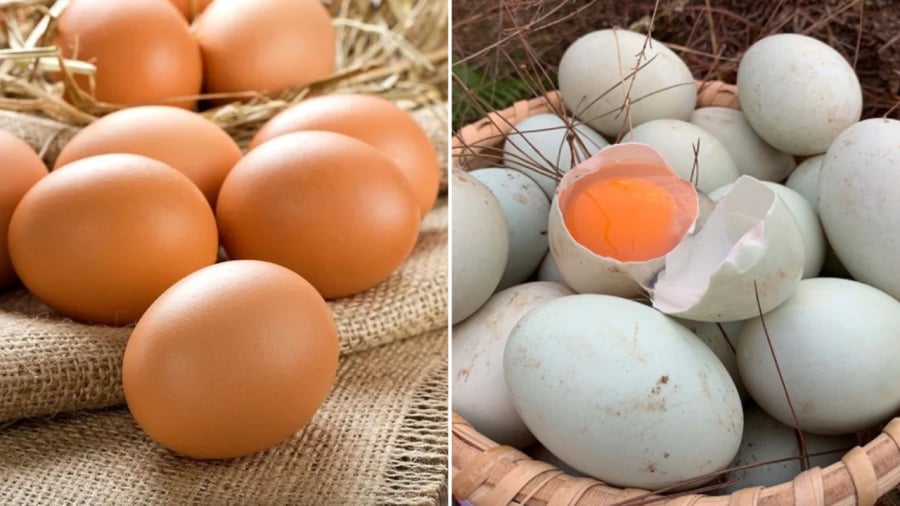From a culinary science perspective, the distribution of salt in food can be explained by osmosis and diffusion. Alice Waters, a renowned American chef and culinary educator, elaborates on this in her book, “Salt, Fat, Acid, Heat.”
Osmosis and diffusion occur due to the tendency to reach equilibrium between two environments with unequal solute concentrations.
Why are duck eggs preferred for making salted eggs instead of chicken eggs?
In food, the movement of water through a membrane from an area of lower salt concentration (less salty) to an area of higher salt concentration (saltier) is called osmosis. Diffusion is a slower process where salt moves from an area of higher concentration to an area of lower concentration. These two processes continue until the salt concentration in both environments reaches a balanced state.
When salting eggs, the salt diffuses through the eggshell and into the interior, pushing water out. This process continues until the salt concentration inside and outside the egg reaches equilibrium. Salt also has a preservative effect, inhibiting bacterial growth and keeping the salted eggs safe. Additionally, it causes the protein in the eggs to coagulate, resulting in the yolk solidifying over time.
Research indicates that the primary component of eggshells is calcium carbonate. Eggshells have tiny pores that allow the exchange of oxygen, carbon dioxide, and moisture. Duck eggshells have more pores than chicken eggshells, allowing the saltwater solution to penetrate more easily. Consequently, the yolk also requires less time to solidify.

From a culinary science perspective, there are several reasons why salted duck eggs are more common than salted chicken eggs.
Duck eggs are typically 30% larger than chicken eggs. When salting chicken eggs, the loss of water makes the already small yolk even smaller.
Additionally, duck eggs have a higher fat content, resulting in a glossier and more appealing appearance of the yolk compared to salted chicken eggs.
Of course, you can still make salted chicken eggs if you wish.
How to Make Salted Duck Eggs
– Select fresh eggs
Choose eggs that are of moderate size and uniform in shape. To determine their freshness, gently shake the egg. If you don’t hear any sound, the egg is fresh.
– Prepare the eggs
Rinse the eggs and let them air dry on a wire rack or with a fan. Prepare some white alcohol (rice wine/gin) and either dip or spray the eggs with it (ensure the shell is evenly coated). Then, arrange the eggs in a basket to dry. The alcohol helps sanitize the eggs, ensuring they remain unspoiled during the brining process.
– Prepare the brine
In a pot, combine 1 liter of boiling water with 500 grams of salt. Add a small amount of cinnamon and anise to impart a pleasant aroma. Place the pot on the stove and heat it until all the salt has dissolved. Then, remove it from the heat and let the brine cool completely. This amount of brine is sufficient for brining about 10 eggs.
– Brine the eggs
Arrange the eggs in a ceramic or glass container. Pour the cooled brine over the eggs, ensuring they are completely submerged. Use a ceramic plate or a plastic bag filled with brine to weigh down any floating eggs. Store the container in a cool, well-ventilated area, maintaining a consistent position throughout the brining process.
After approximately 14 days, the eggs will be ready for consumption.
– Cooking the Salted Eggs

Salted eggs can be used in a variety of dishes.
Depending on the dish you plan to make, you can cook the salted eggs accordingly. You may choose to hard-boil the entire egg and then peel it. These eggs can be enjoyed with congee.
Typically, only the yolk is used in cooking. Crack the egg into a bowl and separate the yolk from the white. Rinse the yolk gently to remove any remaining egg white. Dip it in alcohol to eliminate any fishy odor. Apply a thin layer of sesame oil to the yolk to enhance its flavor and appearance. Bake the yolk in an oven at 170°C for about 6 minutes. Alternatively, you can steam the yolk if you don’t have an oven. These salted yolks can be used as a filling for pastries or as a sauce base…

































